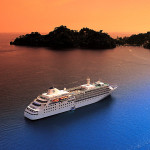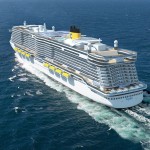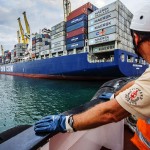Il settore dei trasporti terrestri e ferroviari e delle relative infrastrutture sta affrontando sfide e nuove opportunit...
International Maritime Organization
World Maritime University (WMU)
The World Maritime University (WMU) operates under the auspices of the International Maritime Organization (IMO), a specialized agency of the United Nations. WMU thus enjoys the status, privileges and immunities of a UN institution in Sweden.
- A) Corsi post-laurea offerti
(http://www.wmu.se/academic-programs)
WMU offers only postgraduate degrees:
- Doctor of Philosophy (Ph.D.)
- Master of Science (M.Sc.)
- Postgraduate Diploma (PGD)
In Malmö, Sweden, WMU offers a program leading to a Master of Science in Maritime Affairs. Students can specialize in one of six areas:
- Shipping Management & Logistics
- Port Management
- Maritime Safety & Environmental Administration
- Marine Environmental & Ocean Management
- Maritime Law & Policy
- Maritime Education & Training
In Shanghai, China, WMU offers a Master of Science in International Transport & Logistics, and in Dalian, China, WMU offers a Master of Science in Maritime Safety & Environmental Management. The China-based programs are designed and taught by WMU professors. WMU offers a Ph.D. program in Maritime Affairs that can be completed at WMU or elsewhere (see below). The University also offers a Postgraduate Diploma in Marine Insurance by distance learning, in association with Lloyd’s Maritime Academy (http://www.lloydsmaritimeacademy.com).
- B) Programmi di ricerca post-laurea (dottorati di ricerca)
(http://www.wmu.se/phd-programs)
Principal areas of research
Most doctoral research falls within one of the following topics, but the WMU programme also offers excellent opportunities for interdisciplinary projects, allowing doctoral candidates to pursue their own, and their organization’s, particular interests.
Marine Environmental Research (MER Group)
This research area covers environmental management issues in coastal and ocean areas, particularly those related to maritime sectors such as shipping. Interdisciplinary issues involving oceanography, pollution, and ecosystem-based management also fall within this area of research. Recent projects include ballast water management issues, including invasive species; PSSAs; oil spill contingency planning; marine mammals and shipping; climate change and integrated coastal and ocean management.
Maritime Administration: Law, Policy and Security
This research area covers the legislative, regulatory, and enforcement roles of governments and administrations in the context of specific problems facing the maritime industry. These include security, law of the sea, seafarer’s rights, labour standards, marine environmental law, and other issues in the public or private domain with a direct impact on the development of maritime law and policy. Recent research projects include comparative analyses of the Rotterdam Rules and a critical evaluation of the international legal framework for piracy and other unlawful acts at sea.
Shipping and Port Management
This research area explores all areas of shipping and port management, and offers the chance of carrying out in-depth investigation within the fields of maritime economics, ship or port operations and management, and shipping and port policy, as well as in the related fields of logistics, ship finance, cargo handling, and port governance.
Maritime Technology and Education
The research area covers both technical developments in the shipping industry and their relation to maritime educational processes, maritime human resource management and cultural, gender and linguistic issues. It includes interdisciplinary work linking technical innovation and education, such as simulation training, information/communication technology and organizational knowledge management. Recent activities include the development of IMO model courses on energy-efficient ship operation, the establishment of accreditation systems within the wider scope of quality management in maritime education, collaborative learning in maritime education, educational psychology, inter-cultural psychology, communication and human factors, women seafarers and identity management, and organizational learning in shipping companies.
Maritime Risk and System Safety (MaRiSa Group)
This research group specialises in developing multi-disciplinary research angles in the area of maritime risk governance and management with a special focus on maritime safety and human-related issues. Technical developments, such as the concept of e-navigation or the use of simulation to help maritime risk assessment are also considered. The group has been very active over a long period in a wide range of EU-funded projects including MarNIS, ADOPTMAN, IMPACT and TeamSafety, as well as other projects such as ProGreenShipOperation and research on SAR for passenger ships.
Maritime Energy
Energy management and efficiency, renewable energy and technological innovation underpin the work of this group, which aims to provide solutions that help the international maritime community to achieve a sustainable and low-carbon industry. The group’s research focuses on the fundamental understanding of energy and applying this understanding across the field from ships to ports, and from offshore structures to shipyards, to ensure the cost-effective, safe and environmentally friendly use of resources.
IMO International Maritime Law Institute (Malta)
The IMO International Maritime Law Institute was established under the auspices of the International Maritime Organization, a specialised agency of the United Nations.
The Institute is an international centre for the training of specialists in maritime law. It also contributes to the development and dissemination of knowledge and expertise in international maritime law, with special reference to the international regulations and procedures for safety and efficiency of shipping and the prevention of marine pollution.
- A) Corsi post-laurea offerti
1) LL.M. Programme
(http://www.imli.org/programmes-and-courses/unique-nature-llm-programme)
IMLI offers a specialised post-graduate course leading to the degree of Master of Laws (LL.M.) in International Maritime Law. The programme consists of post-graduate education in all areas of international maritime law, including law of the sea, marine environmental law and shipping law. This course is mainly addressed to lawyers, legal advisers, judges and legal draftsmen and women whose duties encompass maritime issues and who are seeking specialisation. The course is also open to law graduates of any country who intend to pursue a legal career in the field of maritime law whether in the public or private sectors, whether in practice, administration or academia.
Although originally most suitable for candidates from developing countries, the course has grown into a comprehensive and versatile curriculum accommodating the needs of students from around the world. The focus of the course is “the rule of international maritime law”.
The teaching is delivered by the Institute's resident academic staff as well as by eminent visiting fellows who are practitioners and academics of international repute in various fields of maritime law. The entire programme, including teaching as well as the writing of examinations, dissertations and projects, is in the English language.
- B) Programmi di ricerca post-laurea
(http://www.imli.org/programmes-and-courses/research-degree-programme )
IMLI offers a Research Degree programme leading to the award of the Degree of Magister Juris (M.Jur.) in International Maritime Law and the Degree of Doctor of Philosophy (Ph.D.) in International Maritime Law. Candidates are expected to undergo their studies in IMLI’s Research Degree programme with a high degree of independence; thus, the programme can be largely undertaken from abroad. Candidates are assigned individual academic supervisors drawn from a list of internationally-recognized experts.
1) Magister Juris (M.Jur.) in International Maritime Law
Duration of study
Studies for the M.Jur. Degree are to extend over a period of one (1) academic year after enrolment in the programme.
Candidates for the M.Jur. must engage in resident research at the Institute for a time to be determined in each case prior to enrolment, and must attend such IMLI courses as may be required by the Director following consultation with the candidate’s Supervisor.
The candidate must submit his or her M.Jur. dissertation not later than the end of the second calendar month following the end of the academic year.
Award of the degree
Award of the M.Jur. Degree is conditional upon the successful examination of a dissertation of between thirty (30) and fifty (50) thousand words containing original contributions to knowledge in a subject within the syllabus of the Institute.
2) Doctor of Philosophy (Ph.D.) in International Maritime Law
Duration of study
Studies for the Ph.D. Degree shall extend over a period of not less than two (2) nor more than four (4) academic years after enrolment as a candidate for that Degree. During this period the candidate shall engage in resident research at the Institute for a time or times to be determined in each case prior to enrolment. Students are required to register with the Institute at the beginning of each academic year throughout the programme.
Award of the degree
The Ph.D. Degree shall be awarded upon the successful examination of a thesis of between eighty (80) and one hundred (100) thousand words containing original and significant contributions to knowledge in a subject within the syllabus of the Institute.
- C) Corsi professionali organizzati dall’IMLI
1) Advanced Diploma
(http://www.imli.org/programmes-and-courses/advanced-diploma)
This new IMLI Programme, which was launched in 2005, is designed to benefit professionals involved in maritime practice both in the private and in the public sector (including at the most senior levels) who, because of their careers, are unable to be away from their jobs for any length of time in excess of a few weeks per year.
Also bearing in mind the differences between the public and private dimensions of international maritime law the Programme is split into three distinct strands as follows:
-Advanced Diploma in International Maritime Law (Public);
-Advanced Diploma in International Maritime Law (Private); and
- Advanced Diploma in International Maritime Law (General).
Candidates are required to select one of these strands upon admission.
- D) Altri corsi organizzati dall’IMLI
1) Short Courses
(http://www.imli.org/programmes-and-courses/short-courses)
Every year, the Institute organizes intensive short courses for persons who are unable to attend IMLI for a full academic year but who are seeking to update their knowledge upon current developments only in a certain area of law.
Teaching at IMLI on the LL.M. Programme is based on the modular system. It is therefore possible for a small number of applicants to attend these modules as self – contained courses. Applicants are advised that they should be prepared to be flexible with respect to the timing of such courses as this will be determined by the requirements of the more general LL.M. Programme.
Short courses are delivered by panels of internationally recognized lawyers and academics. A certificate of attendance is issued by the Institute.
Link to Short Courses 2015/2016 calendar: http://www.imli.org/sites/default/files/uploads/short_courses_2015-2016.pdf
Alcune università all’estero con corsi post-laurea (LLM, PhD e altri titoli di ricerca) in diritto della navigazione e materie affini
NORVEGIA
- University of Oslo (Scandinavian Institute of Maritime Law)
- LLM in Maritime Law (http://www.uio.no/english/studies/programmes/maritime-master/index.html)
- Organized Research Training: PhD (http://www.jus.uio.no/english/research/doctoral-degree-and-career/phd/index.html)
- philos. - the independent degree (http://www.uio.no/english/about/regulations/research/doctoral-degree/drphiloseng.html)
OLANDA
- Erasmus University Rotterdam
- Master of Science in Maritime and transport law (http://www.eur.nl/english/master/programmes/commercial_law/maritime_transport_law/)
REGNO UNITO
- Cardiff University
- LLM in Shipping Law (http://courses.cardiff.ac.uk/postgraduate/course/detail/p369.html)
- MSc International transport (http://courses.cardiff.ac.uk/postgraduate/course/detail/p166.html)
- PhD in Logistic and operation management (http://courses.cardiff.ac.uk/postgraduate/course/detail/p187.html)
- MSc Marine policy (http://courses.cardiff.ac.uk/postgraduate/course/detail/p191.html)
- City University (London)
- LLM Maritime Law (http://www.city.ac.uk/courses/postgraduate/maritime-law)
- LLM Maritime law delivered in Greece (http://www.city.ac.uk/courses/postgraduate/-maritime-law-greece)
- London Metropolitan Univervisity
- LLM International trade transport and maritime law (http://www.londonmet.ac.uk/courses/postgraduate/2015/international-trade-transport-and-maritime-law---llm/)
- University of Southampton (Institute of Maritime Law) [si vedano dettagli, infra]
- LLM in Maritime Law
- University of Wales Swansea (Institute of International Shipping and Trade Law)
(http://www.swansea.ac.uk/law/istl/postgraduatedegreesllmmphilphd/ )
LLM Courses include, inter alia, the following:
- LLM in International Maritime law
- http://www.swansea.ac.uk/law/shipping-trade-law-department/llmdegrees/llmininternationalmaritimelaw/
- LM in International Commercial and Maritime law (http://www.swansea.ac.uk/law/shipping-trade-law-department/llmdegrees/llmininternationalcommerciallaw/)
- LLM in Oil and Gas Law (http://www.swansea.ac.uk/law/shipping-trade-law-department/llmdegrees/llminoilandgaslaw/)
- LLM in International Trade Law (http://www.swansea.ac.uk/law/shipping-trade-law-department/llmdegrees/llmininternationaltradelaw/)
Quanto ai programmi di ricerca (http://www.swansea.ac.uk/law/istl/research/)
- D. in Law - The School of Law through the Institute of International Shipping and Trade Law (http://www.swansea.ac.uk/law/istl/) can provide specialist supervision in any subject within the broad province of each of these bodies, such as shipping, charterparties and bills of lading and international trade. The expertise in the School of Law ranges much wider and supervision may be undertaken in areas including legal theory, global law, international law, European law, environmental law, criminal law and evidence, human rights law, medical law, public and administrative law, family law, ethics and philosophy and socio legal studies.
- University Of Nottingham - School Of Law
- LLM in Maritime law http://www.nottingham.ac.uk/pgstudy/courses/law/maritime-law-llm.aspx
- University Of London Queen Mary
- LLM in International shipping law http://www.law.qmul.ac.uk/postgraduate/courses/items/138030.html
USA
- Tulane Law School
(http://www.law.tulane.edu/tlsAcademicPrograms/index.aspx?id=1700)
Tulane Law School offers individuals who already have law degrees the opportunity to pursue advanced degrees in law through its graduate studies programs. Six different Master of Laws (LLM) degree programs are offered, and lawyers from throughout the world enroll in Tulane's LLM programs.
Tulane Law School also offers the Doctor of Juridical Science (SJD) to a small number of candidates who already hold the LLM. This is a research-oriented degree requiring completion of a dissertation which makes an original and significant contribution to legal scholarship.
CANADA
- Dalhousie Law School
Graduate programs (http://www.dal.ca/faculty/law/melaw/programs.html)
LLM program
The Master's degree allows students to pursue research in marine and environmental law by course work and thesis, or by coursework alone. The LLM program ordinarily takes a year of full-time study but it may also be completed on a part-time basis.
PhD program
The primary requirement for the Doctoral degree, aside from one year of residency, is the completion of a substantial dissertation in marine or environmental law. Opportunities for teaching and research may also be available (http://www.dal.ca/faculty/law/melaw/research.html)
- McGill University (Institute of Air and Space)
- LLM in Air and space law (https://www.mcgill.ca/law-gradprograms/programs/llm/iasl/)
SINGAPORE
- National University Of Singapore - School of Law
HONG KONG
- City University of Hong Kong - School of Law
- LLM (Maritime and Transportation Law) (http://www6.cityu.edu.hk/slw/academic/postgraduate_llm.html )
SUDAFRICA
- University Of Capetown
- LLM in Marine and environmental law (http://www.imel.uct.ac.za/)
- LLM in Shipping law (http://www.sals.uct.ac.za/sals/nature/overview/llm/#marine)
University of Southampton - Institute of Maritime Law
Corsi post-laurea/professionali offerti:
1) LLM in Maritime Law
Southampton Law School offers the UK’s leading postgraduate legal qualification in maritime law. This prestigious programme attracts students from across the world who are taught by internationally-renowned experts working at the very forefront of the development of maritime law in the UK and globally. The internationally-acclaimed Institute of Maritime Law is an integral part of the School and the Institute’s staff make a major contribution to teaching on the programme.
Typical course content:
Students will choose four modules from the list below as well as write a disseration on an agreed topic.
http://www.southampton.ac.uk/law/postgraduate/taught_courses/courses/LLM_maritime_law.page
Dottorati di ricerca in diritto marittimo:
2) MPhil and PhD Research Degrees
(http://www.southampton.ac.uk/law/postgraduate/research_degrees.page)
The University offers two research degree programmes: MPhil (Master of Philosophy) and PhD (Doctor of Philosophy). Within the context of both of these programmes students will have opportunities to:
- gain expert knowledge in a specialist field.
- foster the capacity for originality and constructive criticism.
- participate in interdisciplinary personal and professional skills training co-ordinated through the Faculty Graduate School.
- network with other postgraduate research students through the Faculty Graduate School activities.
MPhil
All research students are registered initially for the degree of MPhil. The minimum period of study for an MPhil is one year (full-time), but in most cases postgraduate research students enrol for two years (full-time). Your initial studies, under the guidance of an academic supervisor, will prepare you for potential transfer to PhD registration. Alternatively you may complete an MPhil thesis, normally within two years (full-time). Unlike the PhD thesis, there is no absolute requirement that an MPhil make an original contribution to knowledge, rather it is required that you demonstrate advanced study.
Upgrading to PhD candidature
After significant progress has been made with research and writing (usually during the second year of study in the case of full-time candidates) the student may apply for upgrading to PhD candidature. The upgrade involves scrutiny of a number of chapters of the thesis by an advisory committee of two or more members of the Law School, and a formal discussion of these (viva) between the members of the committee and the research student. PhD study takes place within a demanding and rigorous research environment. The depth of your personal knowledge will increase and you will be expected to make an independent, original, contribution to knowledge in your field. The School of Law welcomes enquiries from prospective students interested in pursuing a research degree in maritime and international trade law. Members of the Institute who are also academic members of the School often supervise such research.
Lloyd’s Maritime Academy
Offre un’ampia gamma di corsi post-laurea, soprattutto indirizzati alla formazione ed aggiornamento dei professionisti del settore marittimo ed assicurativo.
Si veda http://www.lloydsmaritimeacademy.com/ per la lista completa dei corsi, alcuni dei quali sono offerti in modalità remota (“distance learning”).
The Institute of Chartered Shipbrokers (ICS)
(http://www.ics.org.uk/index.htm)
The Institute of Chartered Shipbrokers (ICS) is the only internationally recognised professional body representing shipbrokers, managers and agents throughout the world.
With 23 Branches in key shipping areas, 3,500 individuals and 120 companies, membership of ICS shows a commitment to maintaining the highest professional standards across the shipping industry.
Courses available at ICS are as follows (http://www.ics.org.uk/learning/choosing-your-qualifications):
Professional Qualifying Examinations (PQE)
The Professional Qualifying Examinations (PQE) form the pinnacle of the ICS qualification. Completion of these exams is an illustration of one's developed knowledge and understanding of the commercial shipping industry. It comprises 7 exams which you can do over 5 years. Many people however complete in a much shorter time, and are often also eligible for exemptions to some exams based on industry experience and prior qualifications. Exemptions don't apply to the Diplomas, so if you are eligible for a few, it may make sense to start your journey with PQE.
Embarking on PQE will mean you need to sit a minimum of two exams in your first year (one of which must be Shipping Business), and can pick and choose how many to take thereafter from the syllabus. Once you have completed your PQEs you will be eligible to apply for membership with the Institute.
Foundation Diploma
The Foundation Diploma is ideal for people with little industry experience, but who would like to gain practical knowledge and a sound qualification. It involves taking the Introduction to Shipping paper plus one other subject from the group 2 list of Optional Papers of the ICS syllabus.
The Foundation Diploma is a standalone qualification in its own right, but because it can count towards your membership examinations it's also a great way to ease into study and gives you an overall view of the business.
Advanced Diploma
The Advanced Diploma has been designed as a stepping stone into full professional qualification and suits those who have some industry knowledge. Like the Foundation Diploma, the Advanced Diploma is a recognised and respected qualification. It involves taking the ICS benchmark paper Shipping Business plus one other subject from the group 2 list of Optional Papers of the ICS syllabus.
International Insitute of Air and Space Law
Leiden University (Netherlands)
https://www.universiteitleiden.nl/en/law/institute-of-public-law/institute-for-air-space-law/
Institute of Air and Space Law
University of Cologne (Germany)
http://www.ilwr.jura.uni-koeln.de/8366.html?&no_cache=1
Institute of Air and space Law (IALS) of the University of Lapland
Faculty of Law
University of Lapland (Finland)
http://www.ulapland.fi/InEnglish/Units/Faculty-of-Law/Institutes/Institute-of-Air-and-Space-Law
L.L.M. in Space, Cyber and Telecom
University of Nebraska (USA)
http://law.unl.edu/spacecyberlaw/
Master of Laws (L.L.M.) program in Air and Space Law
The University of Mississippi School of Law (USA)
http://law.olemiss.edu/academics-programs/llm/
IFURTA Institut de Formation Universitaire et de Recherche du Transport Aerien
Master 2 professionnel Mention Droit des Affaires specialite "Droit et Managment du Transport Aerien"
Universitè Aix Marseille (France)










